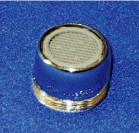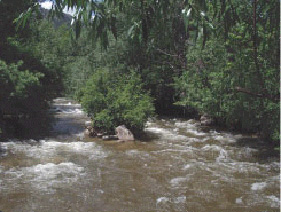Reducing hot water use saves energy because your hot water heater has less work to do. Recent research has shown that on average about 73% of the water used through residential faucets is hot water (DeOreo, et. al. 2001).
Installing new faucet aerators on your kitchen and bathroom sinks is a good idea and can result in some energy savings, particularly if you live in an older house and have older aerators with high flow rates. Faucet aerators are inexpensive (starting at $1 each) and are an inexpensive and effective way to save money in your home.

Niagara aerator.
If you are looking for further energy savings, don’t let the faucet run continuously while brushing your teeth or washing dishes. If your faucet uses 2.2 gpm, then you can save about 1.6 gallons of hot water for every minute you reduce your faucet use.
Benefits and Costs
If you are looking for inexpensive ways to save water and a little energy, new faucet aerators may provide the most bang for the buck. Faucet aerators are an inexpensive item. Basic bathroom faucet aerators start at about $1 each and prices go up depending on the features you desire. All faucet aerators manufactured in the U.S. must use 2.2 gallons per minute (gpm) or less.
The water, wastewater, and energy saving benefits you get from installing new faucet aerators is primarily determined by your current aerators. But since faucet aerators are cheap and the water savings are well documented, it’s a safe bet that you will pay for your aerator investment in less than two years.
Environmental Benefits
By following Faucet Water Saving Tips, you can help reduce household water and wastewater use, which can have far reaching environmental benefits. Water conservation reduces water demand, which allows rivers and streams to maintain adequate water levels and flow. This helps to sustain healthy aquatic ecosystems. Conservation also reduces the need to develop new water treatment facilities and new water storage – a process that often causes unfavorable environmental repercussions. Additionally, conservation reduces the need to overdraw from groundwater resources, which can be vulnerable to depletion and contamination. Indirectly, saving water also helps to reduce energy consumption for water and wastewater development, treatment, and distribution.

Figure 1: Adequate stream flows are necessary to maintain healthy aquatic ecosystems.
- What to Do if Your House Smells Like Gas but There’s No Leak - February 6, 2023
- Why Is There a Burning Smell Coming From My Vents? - August 16, 2022
- How to Remove the Musty Smell From Your Air Conditioner - August 16, 2022
